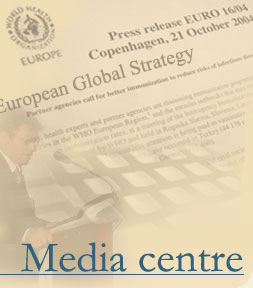Food safety and nutrition, poliomyelitis eradication and better service to countries on the menu of the WHO Regional Committee for Europe
Copenhagen
A new approach to supporting health system development in each of the 51 countries of the WHO European Region, a unique food and nutrition action plan and poliomyelitis eradication top the agenda of the fiftieth session of the WHO Regional Committee for Europe being held in Copenhagen Denmark, 11 to 14 September. As the governing body of WHO in the European Region, the Regional Committee, which includes health ministers or their designated representatives from all Member States, meets once a year to review outcomes of the past year’s activities, agree on plans for new programmes and approve the budget.
Food safety and nutrition
Acknowledging the importance of the growing burden of food-related ill health and its societal and health service costs, the Regional Committee will debate the adoption of Europe’s first policy and action plan on food and nutrition. The action plan provides a unique framework that links strategies for nutrition, food safety and sustainable food supply (food security).
Nutrition and food safety have become major public health issues in the Region in recent years. Around 130 million people in the WHO European Region are estimated to be affected by episodes of foodborne diseases each year. Bovine spongiform encephalopathy (BSE), chemical contamination, diarrhoea, the emergence of new pathogens, the use of antibiotics in animal husbandry and the possible transfer of antibiotic resistance to human pathogens are all of major concern. In addition, low breastfeeding rates and poor weaning practices affect the health of young children, and increasing obesity contributes to Europe’s biggest killers, cardiovascular diseases and cancer. Iodine-deficiency disorders and iron-deficiency anaemia are just two of the main nutrient deficiencies facing the WHO European Region.
Advancing towards poliomyelitis eradication
Also on the agenda is a resolution related to the eradication of poliomyelitis from the European Region. For the first time in the history of the Region, no wild poliovirus circulation has been detected for over one year, since the last case occurred on 26 November 1998. Eradication will become a reality only if all countries of the Region unite their efforts to maintain high immunization coverage and high-quality surveillance, and take all appropriate action to ensure laboratory containment of wild poliovirus.
New country strategies
Building on the recommendations of an external evaluation of ten years of the WHO Regional Office’s intensified work with 26 central and eastern European countries, in the EUROHEALTH programme, a new country intervention strategy, which takes account of Europe’s diverse political and health situations, is being proposed.
“This new strategy is designed to match our services to the specific needs and features of each country. It is not limited to one part of the Region,” notes Dr Marc Danzon, WHO Regional Director for Europe. “It will be up to each country, in consultation with the Regional Office, to choose the services that it needs most and to participate in the services that it feels are most important both for itself and as a contribution to regional development.”
The strategy builds on the practical experience gained by the Regional Office in intervening at the country level over the last ten years, its expanding networks of experts in all priority areas of public health and its detailed knowledge of health systems in different countries. It calls for better coordination between the Regional Office’s technical programmes and the strengthening of international partnerships so as to avoid instances where contradictory advice and uncoordinated activities could result in inefficient use of scarce resources. Contexts well suited to stronger partnerships include the mechanism of accession to membership of the European Union and the grouping of countries within the Stability Pact for South Eastern Europe.
“While we will continue to provide technical support in all areas of public health and in health crises, we will emphasize support for health policy development and health system reform,” states Dr Danzon. “While reforms may differ in intensity and nature from one country to another, all strive to promote universal access, improve quality, strengthen respect for patients and their rights, and rationalize the use of human and material resources. The Regional Office can help countries base their choices on reliable information, comparative analyses, evaluations of their own situations, specific case studies and contacts between officials with complementary experience.”
To support the new strategic approaches and the changes in the services offered, the Regional Office has adopted a new organizational structure.
For more information, contact:
Communication and Advocacy
WHO Regional Office for Europe
Scherfigsvej 8, DK-2100, Copenhagen Ø, Denmark
Fax: +45 39 17 18 80
E-mail: fap@who.dk or ana@who.dk

